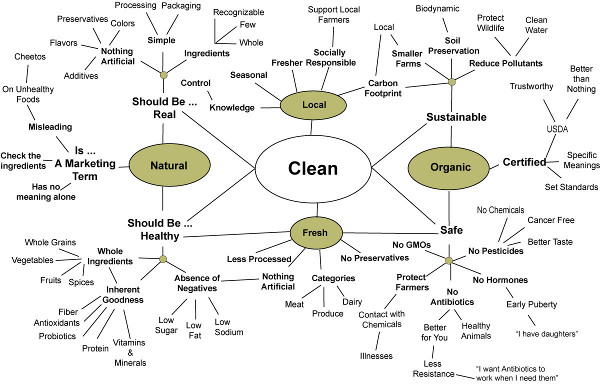What the 1 percent can teach the "All-Knowing Oz"
 In 2004, Oprah Winfrey christened Dr. Mehmet Oz as "America's doctor." Since that coronation, and with Ms. Winfrey's ringing endorsement, Dr. Oz has held court with a broad swath of American consumers through his daytime television program The Dr. Oz Show. As a noted medical expert, Dr. Oz undoubtedly wields considerable influence through the dispensation of advice on how people can live healthier lifestyles. While his influence and impact to motivate people to live healthier lifestyles are to be lauded, it's not entirely clear if the good doctor is staying in tune to where consumers are "at" these days when it comes to their views on health and well-being, especially as it relates to nutrition, diet, and eating habits.
In 2004, Oprah Winfrey christened Dr. Mehmet Oz as "America's doctor." Since that coronation, and with Ms. Winfrey's ringing endorsement, Dr. Oz has held court with a broad swath of American consumers through his daytime television program The Dr. Oz Show. As a noted medical expert, Dr. Oz undoubtedly wields considerable influence through the dispensation of advice on how people can live healthier lifestyles. While his influence and impact to motivate people to live healthier lifestyles are to be lauded, it's not entirely clear if the good doctor is staying in tune to where consumers are "at" these days when it comes to their views on health and well-being, especially as it relates to nutrition, diet, and eating habits.
Is his December 2012 Time magazine piece titled "Give (Frozen) Peas a Chance — and Carrots Too," Dr. Oz tells Americans to ignore the food snobs, long-winded restaurant menus, and glossy cookbooks that proclaim one should buy spinach from the farmer's market in order to be healthy. With a targeted message that you don't have to "eat like the 1%" to be healthy, Dr. Oz hopes to help consumers eat better right now, no matter where they live or what their resources are. In his own words,
"The rise of foodie culture over the past decade has venerated all things small-batch, local-farm and organic--all with premium price tags. But let's be clear: you don't need to eat like the 1% to eat healthily. After several years of research and experience, I have come to an encouraging conclusion: the American food supply is abundant, nutritionally sound, affordable and, with a few simple considerations, comparable to the most elite organic diets. Save the cash; the 99% diet can be good for you."
Coming from America's doctor, these seem like wise words, especially when we consider notions of post-recession Yankee thrift coupled with what seem to be "sensible" nutrition doctrines drawn from Home Economics classes taught in the 1950s. Yet in many ways these views are actually largely out of step with a very large portion of the 99% of today's consumers for whom Dr. Oz's message on food and basic nutrition is intended.
Based on our more than 20 years of immersion into the households and lifestyles of consumers all across America, we find that certain food categories—including canned –are out of step with the consumer's desire for fresh and less processed. We have witnessed just how vulnerable to declines in consumption these categories have become even in times of economic recession. The most recent recession didn't fix the fundamental lack of cultural resonance in categories like canned foods.
In his article, Dr. Oz set forth the argument for relevance based on nutritional grounds. Consumers, however, aren't as concerned about the nutritional value of foods and beverages as they are with perceptions of products being overly processed, less fresh, and, in general, symbols of mass-commoditized "industrial" food.
Consumers will tell Dr. Oz or anyone (like us) who asks them that they want to eat healthier. If the foodie elites were the only patrons of Whole Foods Market, for example, that company would not be where it is today. We are on record saying that today's consumers buy organic and natural foods for a host of factors other than nutritional reasons—and are willing to pay a bit more as well. Far more than Dr. Oz's 1% of America's consumers desire their regular foods from mainstream food retailers to have: (Figure 1)
- Cleaner ingredient lists that feature words they recognize and can pronounce
- Fewer unnecessary additives, chemicals, and preservatives
- Fewer chemicals and toxins used for the growing and processing of conventional products
Figure 1: Consumer Perceptions of Clean Foods Encompass a Variety of Attributes
Figure 1: Consumers frequently say they want cleaner foods and beverages with a variety of attributes. Source: Beyond Organic and Natural 2010, The Hartman Group, Inc.
What Consumers Want
While Dr. Oz's message is intended for consumers, food marketers should also be aware of what consumers want:
- The call for consumers to embrace "regular foods" at regular retail outlets should not be construed as an opportunity for the food industry to lower its standards: consumers across the spectrum of involvement in wellness lifestyles are seeking higher-quality experiences, a key part of which are foods and beverages they hope are fresher and less processed.
- Beyond looking for "healthier for me" products, our research indicates consumers are deeply worried about the role that environmental toxins, chemical additives, and corporate practices play in obesity and poor health. As consumer sentiment continues to shift from personal to corporate responsibility, new product development will be necessary.
- Food companies need to develop more affordable and healthy everyday options that feature short and natural ingredient lists.
- Finally, while he may be America's doctor, we hope Dr. Oz might concede that there may be a difference between being "The Great All-Knowing Oz" and a healthcare professional with a lot of credence among consumers seeking higher-quality wellness experiences in their lives.

